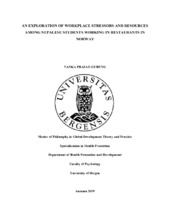An exploration of workplace stressors and resources among Nepalese students working in restaurants in Norway
Master thesis
Permanent lenke
https://hdl.handle.net/1956/21164Utgivelsesdato
2019-12-18Metadata
Vis full innførselSamlinger
- Master theses [157]
Sammendrag
Background and research objective: The number of international students' mobility has continued to grow rapidly across the globe in recent years, they have been called 'educational migrants’. Alongside their studies, educational migrants often participate in the labour market of the host countries in order to fund their living and educational costs. In any workplaces, work stress bas been recognized as the most common issue for employees today. Stress experiences of employees in work environment has negative impacts on their health and wellbeing. However, the availability of resources and the abilities of employees to identify and utilize them, has the potential to reduce harmful effects of stressors on employee health. This study explores stress-resource experiences of Nepalese students working in restaurants in Norway, and the implications of these experiences for their wellbeing. Method: This study adopted a qualitative research approach with a phenomenological design. The data were collected from total of 12 participants, 6 from foreign owned and 6 from Norwegian owned restaurants, from Bergen and Oslo, Norway, using in-depth interviews data collection method to understand their subjective lived experiences in relation to restaurant jobs. The study was framed using the salutogenic approach, particularly the sense of coherence (SOC): comprehensibility, manageability, and meaningfulness, to learn about Nepalese students’ understanding of their work and work situations, and the extent to which they identified and utilized available resources to cope, and how they make meaning of their works. Findings: The study found that workload, worker-to-worker and worker-employer and employee-customer relationships, remuneration and facilities, management of the workplace, job security, family and social relations, health effects and study performances as the key sources of stress among participants. However, stress experiences emerged from worker-employer relationships, remuneration and facilities, workplace management and job security were higher among participants from foreign owned restaurants than those participants from Norwegian owned restaurants. The very sources of stress such as relationships in work environment, payments and amenities, well-managed workplace, job security, family and friends, and study motivations were also explored to be the sources of resource for participants, upon which the participants drew to cope with stressors. However, resource experiences from worker-employer relationships, payments and amenities, job security and well-managed workplace were higher among the participants from Norwegian owned restaurants in comparison to participants from foreign owned restaurants. In addition, opportunities for personal development and advancement from work and personal characteristics such as self-motivation, self-control and exercises: workout/gym and play games were other resources identified and utilized by participants to cope with stressful work situations.
